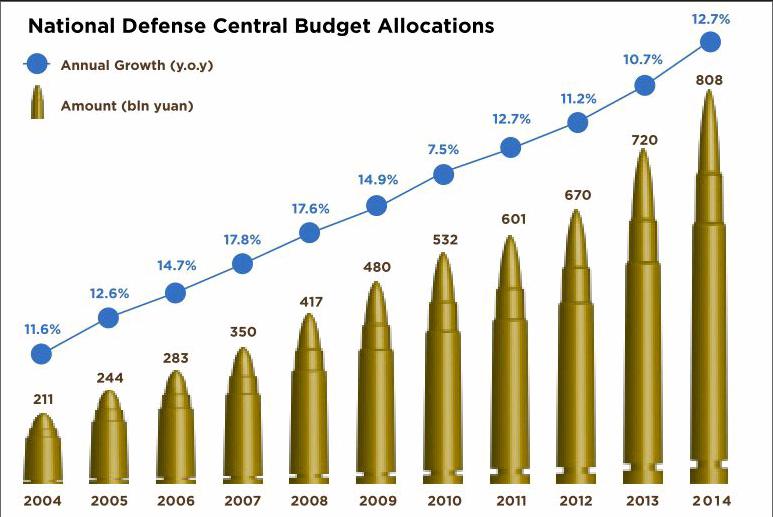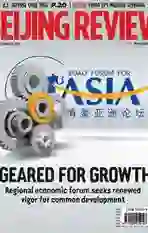Building A Reasonable Power
2014-05-09ByYinPumin
By+Yin+Pumin

Chinas defense spending, despite rapid increases, matches the legitimate national defense needs of a large country.
Chinese President Xi Jinping made these remarks in response to a question on Chinas rising defense budget after a speech sponsored by the Koerber Foundation in Berlin on March 28 during his two-day state visit to Germany.
In early March, the National Peoples Congress, Chinas top legislature, passed the defense budget for this year. According to it, China plans to raise its defense budget by 12.2 percent to 808.2 billion yuan ($130.2 billion) in 2014. The budget marked the biggest increase since a 12.7-percent jump in 2011. The increases in 2012 and 2013 were 11.2 and 10.7 percent, respectively.
Moderate growth
Echoing Xis opinion, experts believe that Chinas defense spending is reasonable and its growth is in line with the countrys economic and security conditions.
“The countrys defense spending is rising along with other expenditure items, such as education and social security,” said Qian Lihua, a major general who used to head the Foreign Affairs Office of the Ministry of National Defense (MND). “It is unrealistic and unreasonable for Chinas defense spending not to go up,” he added.
According to Sun Huangtian, Deputy Director of the General Logistics Department of the Peoples Liberation Army (PLA), this years defense budget will be spent mainly on modernizing the armys weapons and equipment, improving living and working conditions for service personnel, adjusting expenses for army maintenance and enhancing its counterterrorism and disaster relief capabilities.
“In fact, the increases in military expenditure by China are limited in scale,” Sun said. “So we will ensure that every cent of the money is spent wisely to boost the armys effectiveness.”
According to official statistics, China spent 720.2 billion yuan ($116.02 billion) on national defense in 2013, which accounted for only 1.4 percent of the countrys GDP, less than many other countries such as Russia or France.
“The current defense expenditure can only support the basic running of the military and the purchase of weapons and there is still a lot of potential for the military to be stronger,” said Song Zhongping, a military affairs commentator in Beijing.
Military experts believe that an appropriate increase in defense spending will better guaran- tee the realization of the Chinese militarys goal of “being able to combat and win battles.”endprint
“Currently, the Chinese military, which started its development later than other nations, shoulders heavy responsibilities as it is at a stage of intensifying efforts to accomplish the tasks of military mechanization and IT utilization,” said Yin Zhuo, Director of the Expert Consultation Committee of the PLA Navy.
According to Yin, there is a drastic difference between building an information-based army and a traditional army. “For example, the money used to buy a battleship with information-based technology today can buy four to five old-fashioned battleships. Hi-tech weapons and equipment require more money to purchase and maintain,” Yin said.
Money for military personnel is also needed.“With the economic development, salaries of military personnel should also be promoted accordingly,” Yin said. “Especially under the current situation, the military needs more highquality personnel to use and maintain its hi-tech weapons and equipment. It will be difficult to attract and retain outstanding personnel without high salaries.”
“We are out to protect Chinas economic interests, but we have a long way to go in terms of hi-tech military hardware and exercises,” said Wang Huayong, Political Commissar of the East China Sea Fleet of the PLA Navy.
Reuters quoted experts who said that it could be decades before Chinas military is a match for the U.S. armed forces. Statistics show that the United States remains the worlds biggest defense spender, with a budget of $582.4 billion in 2013.
Due to historical reasons, there is a big gap between Chinas defense input and economic development, according to military experts.
“The growth in Chinas defense budget should be seen as a ‘compensatory rise,” said Chen Zhou, a researcher with the Academy of Military Sciences.
According to Chen, after the reform and opening-up policies were initiated in the late 1970s, most of Chinas limited resources were invested in economic construction while defense expenditure fell for more than 10 years.
“The reform and opening up help China register a high and steady economic growth rate, which remarkably improves peoples living standards. But under-spending delayed the upgrading of Chinas military. As a result, there was a ‘generation gap between the militaries of some advanced countries and China,” Chen said.
“The 12.2-percent increase in military budget this year seems quite large, but the fact is China still lags far behind developed countries, and this increase is necessary to improve its national defense construction,” said Xu Guangyu, a senior adviser to the China Arms Control and Disarmament Association.endprint
Tense region
Although Chinas defense budget has been growing at a steady pace over the past four years, experts say the countrys military spending is still far from the level it needs to be, as the country faces increasingly severe security challenges.
Zhong Zhenming, an international relations scholar at the Shanghai-based Tongji University, said that some countries have continued to create an unstable environment for China while accusing it of becoming a regional threat.
“Chinas increased military strength is partly in response to provocative moves taken by some countries, who should review their own policies first,” Zhong said.
Chen with the Academy of Military Sciences highlighted Chinas instable peripheral environment, especially the rising maritime security risks, territorial and maritime disputes, as well as terrorist threats. He pointed out that the increasing strategic pressure and high-risk security environment facing China require the country to invest more in defense. Particularly, the development of its navy, air force and the Second Artillery Corps, which is Chinas strategic missile force, is necessary to secure its homefront and safeguard regional peace.
Disputes between China and neighboring countries that have overlapping maritime claims in the East and South China seas over the past year were marked by controversies after China established its East China Sea Air Defense Identification Zone in November 2013.
According to Qian, the former head of the MNDs Foreign Affairs Office, many Asian countries have increased their defense budgets. According to him, Asias defense spending surpassed that of the European Union in 2012, and reached $320 billion in 2013.
Chen Kai, Vice Chairman of the China Arms Control and Disarmament Association, said that a considerable part of Chinas military strength has been aimed at securing world peace, including anti-piracy patrols in the Gulf of Aden and the Chinese navys involvement in escorting shipments of Syrian chemical weapons this year.
Tan Weihong, a senior colonel from the PLAs Second Artillery Force, said that Chinas economic development has enabled its military to catch up, “but regardless of what the money is spent on or what the military does, other parties harboring Cold War mentalities will object.”
In his speech in Berlin, President Xi dismissed the “China threat” theory, saying that the country will never seek “hegemony or expansion” and will stick to friendly partnerships with its neighbors.
“But China will also not repeat the historic tragedy of being enslaved and colonized by big powers like after the Opium Wars [in the mid-1800s],” Xi said.
As for disputes, Xi added, “We advocate properly handling the frictions and managing disputes through negotiation and dialogue, but on important issues concerning Chinas sovereignty and territorial integrity, we will not stir up trouble, but we are also not afraid of trouble, and will firmly safeguard Chinas legitimate rights.”endprint
